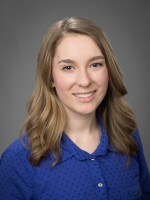Throughout the pandemic, there has been a lack of resources in languages other than English. So some groups aren’t getting the information they need. One of KUNR’s bilingual reporters Natalie Van Hoozer has been reporting on the challenges Latinos and Spanish speakers in Nevada have faced over the last year. She’s also been hosting virtual events in Spanish to provide critical information not readily available to the Spanish-speaking community. KUNR’s Lucia Starbuck talks to her to learn more.
Lucia Starbuck: Natalie, we’ve seen the COVID-19 pandemic disproportionately impact Latinos and Spanish speakers across the U.S. and here in Nevada. People who identify as Hispanic or Latino make up 35% of the state’s COVID-19 cases, but they only make up 29% of our population. Through your reporting, what are you seeing? What are some factors leading to these disparities?
Natalie Van Hoozer: It definitely depends on people’s individual circumstances, just like any demographic group. But to look at one aspect of this, many Latinos are frontline workers. I talked to Maria Davis about this. She’s a professional interpreter who’s worked in Latino community outreach throughout the pandemic.
Maria Davis: A lot of our Hispanic families are working families. Not everybody can afford to stay home. So they have to go out there and find a way to still bring some food to the table.
Van Hoozer: There’s also institutional mistrust. So for example, people who are undocumented can be hesitant to access health services and may be worried they’ll need to reveal their immigration status for things like a COVID test, getting a vaccine, or accessing a food bank. These types of things are not new, but the pandemic has exacerbated the need for resources and the need for clear communication about what people can get from where.

Starbuck: You’ve been trying to reach this community by hosting virtual events in Spanish on Facebook. Can you talk a little bit about those and what kind of gaps you’re filling?
Van Hoozer: So in Northern Nevada, there’s been a patchwork of public health information available in Spanish about COVID coming from various local government agencies and community organizations. These updates are important for combating misinformation about the coronavirus in Spanish, though that messaging isn’t always consistent. Spanish-speaking community leaders are also trying to fill in some of these gaps like I’m trying to with our Facebook Live events in Spanish to connect community members to Spanish-speaking leaders and experts so that they can ask them questions directly about things like vaccines, or even things related to other topics.
Starbuck: One of the first events that you moderated, you brought experts on to talk about school reopening. I know that was, I mean, I can imagine an incredibly stressful time for parents and families. What are some of the particular challenges for students and their families that don’t speak English?
Van Hoozer: One of the most noticeable obstacles for some Spanish-speaking families was that some parents can only help their children in Spanish while their classes are in English. In some cases, parents who only speak Spanish worked with classroom assistants who usually help Spanish-speaking students to learn English. These assistants served as interpreters on the phone and helped answer questions about online learning.
Many parents asked if it was safe to send their kids back to school. That was a concern for families across the board. Nurse practitioner Sonia Rich-Mazzeo was a guest during our event.
Sonia Rich-Mazzeo: "Es un riesgo ir a la escuela hoy en día, es increíble pero así es. Es una decisión personal para cada papá, para cada mamá, ver qué va a hacer”.
Van Hoozer: Here she’s saying that there is a risk with sending your kids to school in person, but that’s a personal decision that each family has to make.
Starbuck: I’m sure those have been difficult conversations for many families. We’ll have to stop here today, but thank you Natalie for sharing your reporting with us.
Natalie Van Hoozer wrote about what inspired her to create virtual events in Spanish, the importance of them and the tips she’s picked up along the way. You can read her first person essay for the Radio Television Digital News Association (RTDNA) here.
For continued coverage on how COVID-19 continues to affect the Spanish-speaking community in Nevada, visit the “En Español.”
Lucia Starbuck is a corps member with Report for America, an initiative of the GroundTruth Project.
Part of this story originally aired during KUNR’s hour-long special, “A Year in the Pandemic.”
KUNR's Jayden Perez adapted this story for the web.








